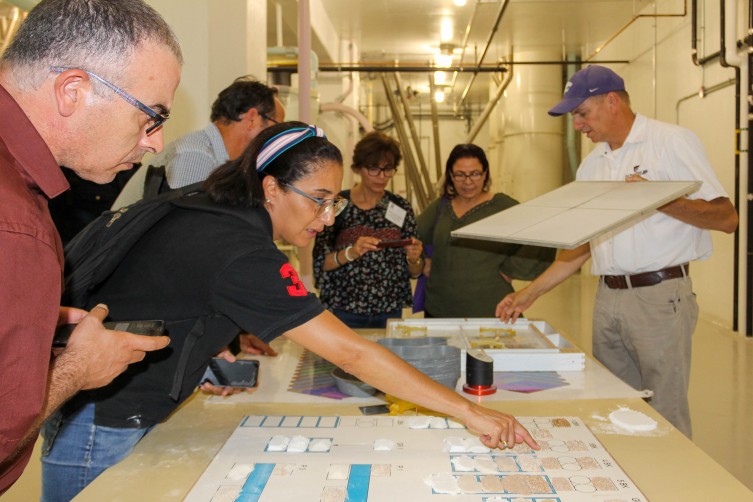Breadcrumb
- Home
- Recent news stories
- USDA Cochran Tunisia Professionals Visit the IGP Institute
The lack of quality in wheat being imported to Tunisia has led to an incredibly high amount of bread waste. In an effort to help change the course of the wheat policy in Tunisia, participants engaged in the USDA Cochran Tunisia Market Reform within the wheat value chain. This course was held August 11-24, 2019 at Kansas State University’s IGP Institute and hosted 9 fellows. The participants engaged in discussions regarding U.S. wheat standards, storage and quality among other things. They also participated in field trips to U.S. Wheat Associates in Washington D.C., farms, grain elevators, flour mills, bakeries and export facilities in New Orleans.
“The quality of wheat being purchased by the Tunisian government is very bad, which leads to waste in the processing stage and by the end user,” says Nabil Maouia, agricultural specialist at USDA foreign agriculture service and course participant.
He adds, “Tunisians lose nearly 9,000 French Baguettes a day, which is an incredible waste. We discussed the issue with our government and built the Cochran Tunisia USDA program.”
The Cochran Fellowship Program provides short-term training opportunities to agricultural professionals from middle-income countries, emerging markets, and emerging democracies. The goals of this program are to help countries develop agricultural systems necessary to meet dietary needs as well as to strengthen the trade linkages.
This course was beneficial to participants to witness how the U.S. manages such a quality of wheat, says Shawn Thiele, IGP Institute associate director and flour milling and grain processing curriculum manager.
“We had participants from a variety of backgrounds including agronomy, engineering, farming, and government officials,” Thiele says. “They were able to use their unique experiences to help each other learn more about the U.S. industry to potentially reform the Tunisian wheat policy.”
Participant, Mounira Hechmi, trainer in the wheat industry at Tunisian Agency for Vocational Training, shared that the most beneficial portion of this course was seeing the entire process of the chain value of wheat.
“It was interesting to be able to establish information over the entire chain value. We were able to see everything from the wheat to the flour to the bakery,” Hechmi says.
In addition to flour milling and grain processing, the IGP Institute also offers courses in the areas of feed manufacturing and quality management, and grain marketing and risk management. To learn more about these other training opportunities, visit the IGP Institute website at www.ksu.edu/igp.
By Katlin Allton, IGP Institute Communications Intern
Participants of the USDA Cochran Tunisia Market Reform within the Wheat Value Chain look at the various wheat consistencies while touring Kansas State University’s Hal Ross Flour Mill.
